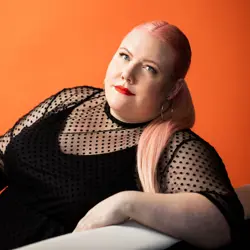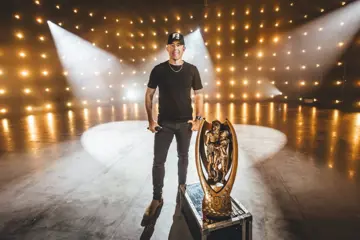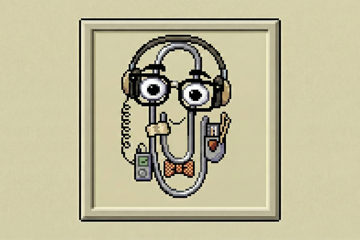 Lindy West
Lindy WestLindy West has found success as a satirical feminist commentator, critiquing body-shaming, American politics and pop culture. But, having recently authored the essay collection The Witches Are Coming, its title referencing the reactionary misrepresentation of #MeToo as a witch-hunt, she's contemplating trying her hand at supernatural fiction. "One thing I didn't expect was the number of people who picked up the book by accident because they thought it was a fantasy novel about witches," West reveals. "Sorry, guys! I feel you, though. Sometimes when I was writing it, I wished it was a fantasy novel about witches too – that would have been way more fun than incessantly thinking about Donald Trump for a year. Maybe that'll be my next book. But I am really proud of how The Witches Are Coming turned out. I think it's funny and I hope it helps people feel a little bit more powerful and a little bit less alone, even if they picked it up by accident." West will again guest at the annual All About Women discussion festival held at the Sydney Opera House to mark International Women's Day (she previously appeared three years ago).
The Seattle native started her writing career in the mid-2000s at the local alt-weekly The Stranger, ultimately rising to film editor. In 2011, West penned a blog about fat-shaming that went viral, heralding her as 'the queen of internet feminism'. She'd write for Jezebel, The Guardian and The New York Times. In 2016 West published her first book, Shrill: Notes From A Loud Woman, with personal essays touching on body image and destigmatising abortion. The following year, West hilariously wrote about attending a Goop Health Summit, a spin-off from Gwyneth Paltrow's infamous lifestyle brand, for The Guardian – revisited in The Witches Are Coming. "That Goop piece was really fun to write! That's my favourite kind of writing – where I get to riff really hard and be as funny and goofy as I want, but there's some kind of bigger political significance underneath that gives it weight."
West has long chronicled the cyber-harassment that female journalists routinely endure. (She once confronted a troll for the radio programme, This American Life.) Nonetheless, in 2017, West left Twitter. Today's writers rely on social media to promote their brands – and remain relevant. Yet West is resolved to stay away. "I can't see myself going back to Twitter. I never even think about it. It's pretty wild that any of us voluntarily download an app that delivers insults and death threats directly to our beds, our jobs, our grandmas' funerals – whatever. I don't need to be that accessible to the public ever again. It wasn't healthy for me psychologically, and I didn't feel good about it ethically. Quitting Twitter has almost certainly had a negative impact on my career – although it's not something I can quantify and, of course, I'm doing fine. But I left when I was already an established writer. I don't know that personal branding is a necessity for aspiring journalists, but Twitter is definitely a place where writers make professional connections, promote their work, and participate in the kinds of complex, real-time conversations that great ideas (ie, pitches) come from. So I never tell anyone to quit Twitter. But I hope eventually young writers won't need it to survive."
Latterly on Twitter there's been heated debate about the perils of celebrity activism – and the accountability culture surrounding it. The British presenter/actor Jameela Jamil – an advocate for body positivity and disability rights – has faced invasive pressure to defend her health record. But, then, Rose McGowan, the prominent #MeToo activist, called out Natalie Portman for a performative protest at the Academy Awards – the A-lister's cape embroidered with the names of ignored female directors. West's take? "Obviously celebrities tend to pull a lot of focus when they get involved in social justice activism. They can be shuffled to the front of movements in which they are not experts, which isn't great for the movement and often not great for the celebrity. I'm sure there are some celebrities who approach activism in bad faith, as PR. But, for the most part, isn't this exactly what we want people to do? Use their platform and influence to fight for justice and equality? There are plenty of celebrities who never say anything about politics at all. Piling on well-meaning ones who engage imperfectly feels like another subtle way that the establishment discourages political action. There's a way for celebrities to be politically active while firmly and gracefully decentring themselves and, to me, that's the goal."
Don't miss a beat with our FREE daily newsletter
West has extensively analysed Trumpism – and the misogyny in US politics. However, the Democratic primaries have exposed the deep fissures in the left, with polarised views on which candidate could combat Trump – and who has the most intersectional policies. "The left needs to offer people something concrete to rally behind. This can't be an anti-Donald Trump platform. That's not enough. It's not anything, really. People have real, tangible, urgent needs. People need healthcare, they need education, they need immediate and drastic action on climate change. The only way forward for the American left is to mean something."
Still, West looks at the world through an American lens, subscribing to a mainstream Western liberal feminist discourse – something which she tacitly acknowledges. "White women need to stop assuming that our experiences and perceptions are universal. We need to stop assuming that our instincts are correct. We need to step aside and learn to take criticism, even harsh criticism, even anger, as a constructive gift. It's just a matter of living in reality. White feminism isn't feminism."
Shrill has been adapted into a TV series for Hulu, with West serving as an executive producer alongside Elizabeth Banks (her alter ego, Annie Easton, is portrayed by Aidy Bryant). And she's pursuing screenwriting – even collaborating with her husband, the musician/comedian Ahamefule J Oluo. "I'd love to keep making television!" West enthuses. "Working on Shrill has been incredibly fun. Of course, I'll keep writing books and columns, but I've been thinking a lot lately about writing fiction. I don't know! I'm just so thankful to have this weird job. I got here by jumping on whatever opportunities opened up in front of me, so I'm going to keep doing that and see where I end up."















